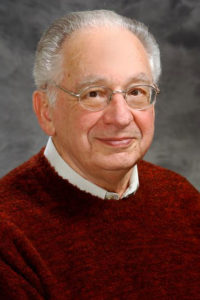Distinguished Achievement Award
Acceptance Remarks: Herman Goldstein
2015 Recipient
The following are remarks by Herman Goldstein, Professor of Law Emeritus, University of Wisconsin Law School upon receipt of the Distinguished Achievement Award in Evidence-Based Crime Policy.
 I greatly appreciate the recognition extended to me by the Center for Evidence-Based Crime Policy by honoring me with your Distinguished Achievement Award. I’m especially appreciative to David, Cynthia and the other members of the awards committee for nominating me to receive the award.
I greatly appreciate the recognition extended to me by the Center for Evidence-Based Crime Policy by honoring me with your Distinguished Achievement Award. I’m especially appreciative to David, Cynthia and the other members of the awards committee for nominating me to receive the award.
Your kindness in making the award has been an occasion for me to engage in some reflections–on the evolution of the Center, on our common interests, and on my own hopes for the future development of policing–and I wanted to share them with you here.
The CEBCP has, in its relatively short history, emerged as playing a central, leadership role in the refinement of strategies for dealing with crime. By bringing to bear expertise of the highest order from the field of criminology, the Center has assured that the policing field has the benefit of all of the extensive research that has been done–and continues to be done–by that discipline. Most important from my standpoint, CEBCP has, as one of its central goals, developed concentrated resources to bear on the evaluation of emerging police strategies. In doing so, it has aggressively engaged with practitioners, making great strides to fill more systematically the gap that has long existed between police practitioners and those–largely from the academic field–who have the skills with which to guide and develop research relating to the police. It has been extraordinarily productive in making a mass of high-quality research available of direct benefit to practitioners.
I have seen many connections between my own work as a long-time student of policing as an institution and the more specialized, intensive work of the CEBCP. I’ve strongly advocated over the past four decades that the police focus their reform efforts more directly on improving their effectiveness and fairness in dealing with the diverse range of behavioral problems they are expected to handle; that they commit themselves in a more targeted way to critical analysis of these problems and their response to them. THE CEBCP, by applying rigorous research methods to the evaluation of newly emerging strategies, has injected new vigor at the ultimate stages in this overall process. I’ve welcomed these efforts. In my own concept of the future development of policing as an institution, I’ve argued that all of the more traditional concerns–about organization, personnel, leadership, training and procedures–should be shaped to support and be informed by our increased knowledge about the ultimate effectiveness and fairness of police operations.
As we look forward, I’m hopeful, stimulated by the flurry of attention focused on policing in recent months, that the policing field will increasingly commit itself, from the bottom up, to thinking analytically and creatively, and in much greater depth, about its day-to-day work. The police — from officers on the street to its chief executives — have so much to contribute and so much to gain from adopting this posture. An enormous amount of work remains to be done, in the “trenches”, toward encouraging and eliciting such a commitment–in “getting the ball rolling” and in constant “sifting and winnowing” of the results of their efforts. Much depends on their engagement. As these efforts spread and mature, facilitated by the greater use of the skills of trained analysts within police agencies, I’m hopeful that a steadily increasing portion of police business will be subject to higher-levels of analysis. The CEBCP is playing a leadership role toward this goal, by engaging in collaborative work between practitioners and academics, by encouraging others to follow their example, and in making the results of their own research so easily accessible to practitioners as guidance for sharpening their operations. All of the elements in this progressive model, taken together, have great promise for building a body of knowledge that will enable the police to meet more effectively the heavy and challenging demands on them for the policing of a complex, diverse and free society.
I’m especially honored to have shared this year’s award with Wesley Skogan, for whom I have the highest regard as one of the true pioneers in conceptualizing and seeking to evaluate innovations in policing. I extend my best wishes for the continued efforts of the CEBCP, and for the success of the symposium.
Herman Goldstein
